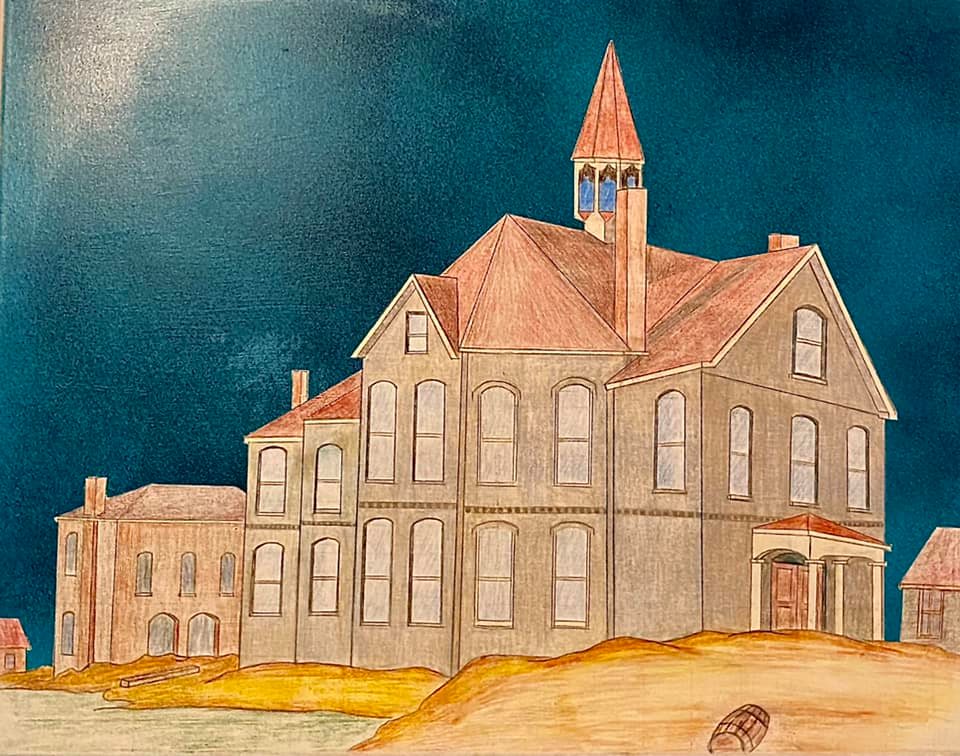
Archive


Archive |

|
||||||||
| The Courthouse | |||
|
The first courthouse I remember was built around 1888 and torn down in 1963. This unfinished painting I have been working on is a rendering drawn from an old picture that was taken while it was still under construction. Piles of dirt, sand and construction debris are evident in the original photograph. I have no idea what the large building to the left was used for. Possibly the jail? The smaller one on the right was torn down and replaced by McGraw’s Mercantile. When I was young it had morphed into Foster’s Department Store before becoming Elmore’s, a five and dime store. I believe it is currently used for offices.
I always thought the old building looked gothic and spooky. Just inside the front doors were bookend staircases on either side that led to the courtroom upstairs. The ceilings were tall, as were the office doors that had transoms overhead. The one above the Chancery Clerk’s door had “The pen is mightier than the sword” painted on its glass. Attorney Hoy Hathorn rescued it during the 1963 demolition, and it was recently donated back to the citizens of the county. It is displayed on the wall behind the original cornerstone which was also returned to the courthouse by way of the Woodward and Fulton families.
Prior to the turn of the twentieth century the courthouse would host a Christmas tree in its entrance for the citizens of the county. People would decorate the tree with small presents to be given to their loved ones on Christmas Eve. On the night before Christmas crowds would gather outside and an employee of the county would take down the gifts one by one, reading aloud the name of the recipient. In the Jennie Newsom’s 1936 book about the history of Winston County my great grandmother, Alice McGee, was mentioned as having been in attendance when her name was announced as having received a gift from the tree.
My cousin, Ervin (Cotton) Clark, was on the city police department when I was a kid. Occasionally my father would drop by his office in the old building. One day he paid Cousin Cotton a visit while I was tagging along. When I was older I learned that Cotton was legally blind. That was why he wore thick, dark glasses. Yet he was on the police department. Don’t you just love small towns? There’s a place for everyone. When I was a teenager we had our own version of Barney Fife.
Cotton’s office was on the west side of the courthouse and the tall windows were raised when we walked in because it was summertime. He was seated behind his desk and all around the room I observed shelves filled with confiscated liquor, beer and weapons. Winston County was a dry county in those days. So confiscating booze was the norm.
He and Daddy were talking in hushed tones because they didn’t want the folks walking by the window outside to hear them. By hushed tones, I mean Cotton wasn’t yelling. My father had lost most of his hearing during the war. I was distracted by the view overlooking the sidewalk. Down the street to the left was the Health Department where Daddy took me for vaccinations when I was little. As I gazed at the sidewalk outside I remembered the day I’d escaped from Nurse Estes and my father while they were trying to hold me down to give me a shot. After biting my way to freedom I managed to flee the Health Department and run up that sidewalk, half naked, almost to Main Street before my father tackled me. As I looked out the window that day I wondered if Cotton had seen me streaking by.
I sat in amazement, looking at the wall of bottles and cans. There were more in front of me on that wall than were in all the ditches between my house and town.
Suddenly Cotton swiveled his chair around and picked up something from a table behind him. He had been telling my father about a man that had murdered his wife by strangling her with a pair of her hose.
“Choked her til she was good’n dead!” I heard.
“And right here’s the evidence! Look’t all that skin hanging on this pair’a hose.” He thrust it across the desk at me.
I nearly turned my chair over running out of his office. That was my most vivid memory of the old courthouse.
My first book of fiction was based on the Janie Sharp murder case that was tried there. Unfortunately, the jurors got it wrong and convicted the teenager, Swinton Permenter, in that case. He was later acquitted when the trial was moved to Winona, Mississippi.
Justice, like beauty, may sometimes be found only in the eyes of the beholder.
On election nights Main Street, in front of the courthouse was barricaded from the soldiers monument on Columbus Street all the way west to Church Street. The whole area became one big outside mall with young folks dancing in the streets as locals bands played. The older crowd sat in lawn chairs, waiting for the rural precincts to bring their ballots into town. Oftentimes the counting went on until the wee hours of the night. I can remember being slung over my father’s shoulder, barely awake, as my parents waited to find out who won the local elections.
I was about eleven or twelve years old when the building came down. I can only imagine all the tales that were told within its walls and on the sidewalks outside.
Pictures, memories and shared stories are all that remain of the old courthouse, aside from the two relics I mentioned earlier. People pass away and memories faded. That’s why I write. I try share my memories and hope others will be motivated to do the same.
Do you have any memories of the old courthouse or its trials you would like to share?
|
|||

|
|
_______________
|